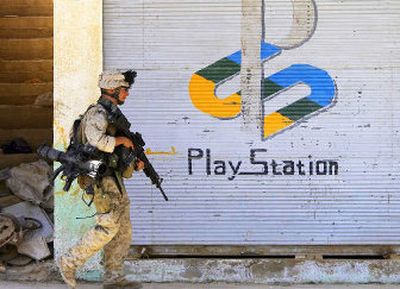Attack shutters water plant

BAGHDAD, Iraq – A mortar attack sparked a fire Friday that forced authorities to shut down a water plant, leaving millions of weary Baghdad residents with dry taps in 100-degree heat, Iraqi officials said.
Just a day earlier, the mayor of the capital threatened to quit because of mounting infrastructure problems – including a lack of clean drinking water.
The blaze at a power station north of Baghdad cut off electricity to a water plant serving northern and western parts of the capital, officials said. The fire halted all distribution from the waterworks, and project director Jassim Mohammed said repairs could take three days.
The U.S. military press office initially quoted Iraqi engineers as saying the fire was triggered by a defective transformer. However, an Iraqi municipal official said at least two mortar rounds struck the power station. Mohammed also attributed the fire to an attack.
A U.S. spokesman for Task Force Baghdad, Master Sgt. Greg Kaufman, said later that unexploded ordnance was found in the area but “we’re still not sure” what triggered the fire.
The water shortage added to the misery of Baghdad’s estimated 6.5 million people, who face frequent electricity outages, erratic fuel supplies, congested traffic, diminished public services and the ever present threat of kidnappings and car bombings.
On Thursday, the city’s mayor, Alaa Mahmoud al-Timimi, threatened to quit unless the government provides more money for repairs. Efforts to expand the water supplies were set back last month when insurgents sabotaged a pipeline near Baghdad.
“There is an anxiousness here to deal with the infrastructure problems and that, for sure, has a political cost to the current government if they can’t fix the problem,” a U.S. official told reporters at a briefing. “And there are no quick fixes.”
It’s just the news Zainab Mohammed, 38, doesn’t want to hear. The housewife said she can handle frequent power cuts and even daily violence “but water, no!”
“I have an infant and she needs a lot of care,” she said. “Water is a vital thing in my life, for my baby’s nursing bottles and her laundry.”
Nada Matti, 49, who works for the Ministry of Finance, said she has stocked up on bottled water “but we can’t afford to do this every day.”
In ongoing bloodshed Friday, an aide to Iraq’s most influential Shiite cleric was sprayed with machine-gun fire and killed in a drive-by shooting, while a suicide car bomb exploded near Prime Minister Ibrahim al-Jaafari’s party offices, killing one person.
Kamal Ezz al-Deen al-Ghuraifi, an aide to Grand Ayatollah Ali al-Sistani, was shot as he left al-Doreen mosque in Baghdad after leading Friday prayers, according to his son, Hamid Kamal. Police confirmed the attack.
“Gunmen in a speeding car sprayed him with machine guns,” said police Lt. Police Lt. Thair Mahmoud. Two bodyguards also were killed and four were wounded, he said.
Al-Ghuraifi, in his 60s, had been an aide to the grand ayatollah for a decade and was the third al-Sistani aide killed recently, said Amer al-Hussaini, a friend of al-Ghuraifi.
“These attacks are aimed at stoking sectarian tensions between Iraqis,” al-Hussaini said.
A Sunni-dominated insurgency has killed more than 1,380 people – mostly civilians and Iraqi forces – since al-Jaafari announced his Shiite-dominated government April 28.
Islamic militants, including Abu Musab al-Zarqawi and his al Qaeda in Iraq group, are determined to start a civil war by attacking Iraqi security forces and members of the Shiite majority, U.S. and Iraqi officials say.
Also Friday, five masked gunmen stormed a Sunni mosque in Baghdad and kidnapped a Muslim preacher, Sheik Amer al-Tikriti, police said.
“The problem of sectarian tension is real,” the U.S. official told reporters Friday. “It requires calm heads on all sides.” The official spoke on condition of anonymity because of U.S. government rules.